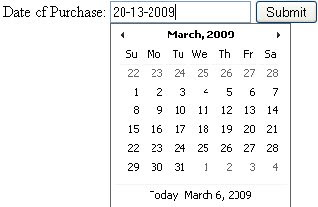Most often asp.net web applications need to validate date in a form. It
is not that easy to play with different format of dates at different
places. Mostly the mm/dd/yyyy (alternatively, mm-dd-yyyy) format of date
is used. But we may need to go dd/mm/yyyy (alternatively, dd-mm-yyyy)
also, and yyyy/mm/dd (alternatively, yyyy-mm-dd) format is no exception
too. This article will discuss how to validate date in all these formats
using simple yet powerful javascript code snippet.

Fig 1: Using ajax calendar extender to pick date into asp.net textbox in dd-mm-yyyy format

Fig 2: Validation of the date in the textbox in dd-mm-yyyy format on form submitLet's start with the addition of a TextBox and an ajax calendarextender in a page.
Here are the functions Validateform() and validateInputDate().
Happy Programming!

Fig 1: Using ajax calendar extender to pick date into asp.net textbox in dd-mm-yyyy format

Fig 2: Validation of the date in the textbox in dd-mm-yyyy format on form submitLet's start with the addition of a TextBox and an ajax calendarextender in a page.
Remember, we need ajax enabled page to use the calendar extender. Note that I have set the format in the calendarextender to dd-MM-yyyy. This will put the date in the targetcontrol (here, txtPurchaseDate) in dd-mm-yyyy format. On client click of the button btnSubmit, the javascript function ValidateForm() will validate the date in the textbox. If it is not in dd-mm-yyyy format, a message will be alerted as in the figures above.
Here are the functions Validateform() and validateInputDate().
function ValidateForm()
{
if(document.getElementById("txtPurchaseDate"))
{
if(validateInputDate(document.getElementById("txtPurchaseDate").value)==false)
{
alert("Please input purchase date in the format dd-mm-yyyy.");
return false;
}
}
}
Now we can change the validateInputDate() date validation function to validate other date formats. Listed below are the functions for validating different date formats.
//Validates date in the format dd-mm-yyyy (e.g. 19-10-2009)
function validateInputDate(dateString){
if (dateString.match(/^(?:(0[1-9][12][0-9]3[01])[\-.](0[1-9]1[012])[\-.](1920)[0-9]{2})$/))
{
return true;
}
else
{
return false;
}
}
//Validates date in the format dd/mm/yyyy (e.g. 19/10/2009)
function validateInputDate(dateString){
if (dateString.match(/^(?:(0[1-9][12][0-9]3[01])[\/.](0[1-9]1[012])[\/.](1920)[0-9]{2})$/))
{
return true;
}
else
{
return false;
}
}
//Validates date in the format dd-mm-yyyy or dd/mm/yyyy (e.g. 19-10-2009 or 19/10/2009)
function validateInputDate(dateString){
if (dateString.match(/^(?:(0[1-9][12][0-9]3[01])[\- \/.](0[1-9]1[012])[\- \/.](1920)[0-9]{2})$/))
{
return true;
}
else
{
return false;
}
}
// Validates date in the format mm/dd/yyyy (e.g. 10/19/2009)
function validateInputDate(dateString){
if (dateString.match(/^(?:(0[1-9]1[012])[\/.](0[1-9][12][0-9]3[01])[\/.](1920)[0-9]{2})$/))
{
return true;
}
else
{
return false;
}
}
// Validates date in the format yyyy-mm-dd or yyyy/mm/dd (e.g. 2009-10-19 or 2009/10/19)
function validateInputDate(dateString){
if (dateString.match(/^(?:(1920)[0-9]{2})[\- \/.](0[1-9]1[012])[\- \/.](0[1-9][12][0-9]3[01])$/))
{
return true;
}
else
{
return false;
}
}
// Validates date in the format yyyy-mm-dd (e.g. 2009-10-19)
function validateInputDate(dateString){
if (dateString.match(/^(?:(1920)[0-9]{2})[\-.](0[1-9]1[012])[\-.](0[1-9][12][0-9]3[01])$/))
{
return true;
}
else
{
return false;
}
}
// Validates date in the format yyyy/mm/dd (e.g. 2009/10/19)
function validateInputDate(dateString){
if (dateString.match(/^(?:(1920)[0-9]{2})[\/.](0[1-9]1[012])[\/.](0[1-9][12][0-9]3[01])$/))
{
return true;
}
else
{
return false;
}
}